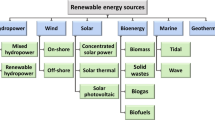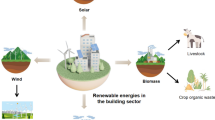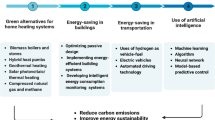Abstract
Energy efficiency in buildings is amongst the economically most interesting options for the reduction of greenhouse gas emissions. So-called Passive Houses have proven to be able to reduce the heating demand of buildings in central European climates by approximately 90% as compared to the existing building stock, at reasonable cost. This is mainly achieved by reducing, to a large extent, all heat losses from the building. The present contribution focuses on some physical aspects of the Passive House principle. It shows how physical reasoning contributed to accurate tools for the prediction of energy consumption and to actual energy savings.
Similar content being viewed by others
References
McKinsey for Vattenfall, as cited in Laustsen, in Jens: Roadmap to Energy Efficiency in Buildings. Proceedings of the 12th International Conference on Passive Houses 2008, 11–12 April 2008, Nuremberg, Darmstadt, Passivhaus Institut (2008)
W. Feist, Thermische Gebäudesimulation: kritische Prüfung unterschiedlicher Modellansätze, Heidelberg, C.F. Müller (1994)
R. Judkoff, J. Neymark, Building Energy Simulation Test (BES-TEST) and Diagnostic Method, National Renewable Energy Laboratory, Golden, Colorado (1995)
EN ISO 13790: Thermal performance of buildings - Calculation of energy use for space heating and cooling
W. Feist (ed.), Passive House Planning Package 2007, Specifications for Quality Approved Passive Houses, Technical Information PHI-2007/1(E), Darmstadt, Passivhaus Institut (December 2007)
W. Feist, Innere Gewinne werden überschätzt. Sonnenenergie & Wärmetechnik 1/94
W. Feist, S. Peper, M. von Oesen, Klimaneutrale Passivhaus-Reihenhaussiedlung in Hannover-Kronsberg. CEPHEUS-Projektinformation No. 18, Hannover, Stadtwerke Hannover AG (2001)
J. Schnieders, W. Feist, R. Pfluger, O. Kah, CEPHEUS - Wissenschaftliche Begleitung und Auswertung, Endbericht, CEPHEUS-Projektinformation No. 22, Fachinformation PHI-2001/9, Darmstadt, Passivhaus Institut (2001)
J. Schnieders, A. Hermelink, CEPHEUS results: measurements and occupants’ satisfaction provide evidence for Passive Houses being an option for sustainable building, Energy Policy 34, 151–171 (2006)
Author information
Authors and Affiliations
Corresponding author
Rights and permissions
About this article
Cite this article
Feist, W., Schnieders, J. Energy efficiency – a key to sustainable housing. Eur. Phys. J. Spec. Top. 176, 141–153 (2009). https://doi.org/10.1140/epjst/e2009-01154-y
Published:
Issue Date:
DOI: https://doi.org/10.1140/epjst/e2009-01154-y




